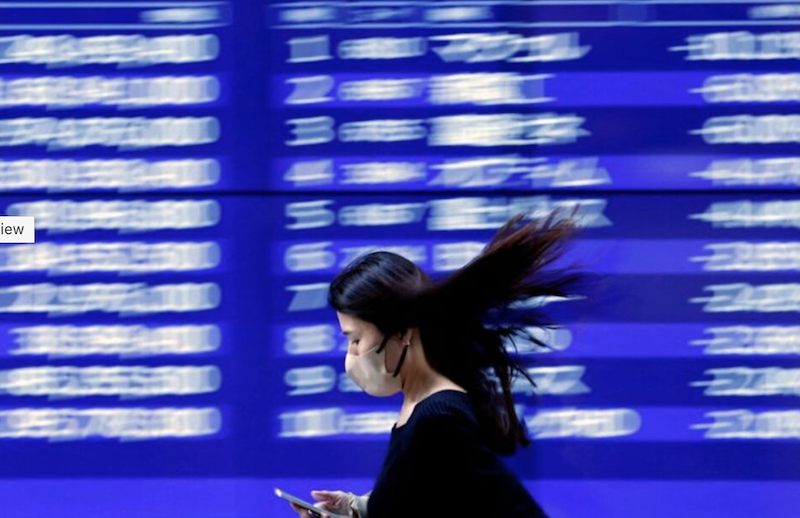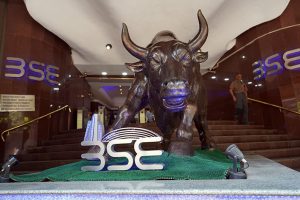Asia’s major stock indexes saw another mixed day on Thursday with investors forced to navigate a path between upbeat news on rising consumer demand in some corners and tumbling tech stocks and recession fears in others.
Japan’s Nikkei stock gauge climbed for a fifth straight session on optimism of a recovery in its domestic retail sector, while financial shares were weighed down by US recession concerns.
US shares had fallen after minutes from the Federal Reserve’s policy meeting last month indicated that banking sector stress could tip the economy into a recession. The minutes followed inflation data, which added to the likelihood of another rate hike next month.
Also on AF: China to Begin Building Moon Base With Lunar Soil by 2028
Japan’s Nikkei share average closed 0.26% higher, or 74.27 points, to close at 28,156.97, erasing an early slide, to cement the longest winning streak in more than a month. The broader Topix finished 0.05% higher.
Lunar transport start-up ispace Inc traded for the first time and closed at 1,201 yen, more than four times its initial public offer price.
Hong Kong stocks ended marginally ahead after earlier plunging, as major shareholders of Alibaba and Tencent moved to slash their holdings in the two Chinese tech giants, with lingering geopolitical tensions keeping investor sentiment weak.
Alibaba plunged as much as 5.2%, before recovering some of those losses to end about 2% down at the close, as SoftBank Group Corp moved to sell almost all of its remaining shares in the e-commerce giant. Alibaba was the biggest drag weighing down the Hang Seng benchmark.
Tencent Extends Losses
Tencent, meanwhile, extended its losses after a 5.2% plunge in the previous session, as Netherlands’ investor Prosus said it may sell more shares in the social media giant.
The Hang Seng Index gained 0.17%, or 34.62 points, to 20,344.48.
Meanwhile, embattled property developer Sunac China, one of many Chinese developers that defaulted last year, fell as much as 60% as the stock resumed trading following a suspension of more than a year.
The Shanghai Composite Index slipped 0.27%, or 8.82 points, to 3,318.36, while the Shenzhen Composite Index on China’s second exchange dropped 0.91%, or 19.47 points, to 2,127.69.
Elsewhere across the region, there were also losses in Singapore, Wellington, Taipei, Manila, Mumbai and Jakarta, though Seoul ticked slightly higher.
MSCI’s broadest index of Asia-Pacific shares outside Japan slipped 0.3%, largely pressured by the drops in Hong Kong tech and China property stocks.
Fed Banks Concerns Linger
Globally, US and European futures nudged up 0.1% and 0.2%, respectively.
Two-year Treasury yields were steady at 3.985% in Asia after dropping more than 8 basis points on Wednesday when data showed US consumer prices barely rose in March.
The annual 5% headline rise for US inflation was the smallest since May 2021 and down from 9.1% last June.
Though with core CPI sticky at an annual 5.6% and minutes from last month’s Fed meeting showing participants cautious about credit tightening in the wake of banking sector wobbles in March, markets are nervous.
However, given the Fed’s concern about banks, much of the week’s focus will fall on earnings from Citi, Wells Fargo and JP Morgan Chase due on Friday.
Oil Holds Onto Gains
“It is an ‘if’ monetary policy world, that is, wait and see about banking and financial conditions,” said Sam Rines, managing director at research firm CORBŪ in Texas. “Banking sector issues are explicitly part of the reaction function now.”
Goldman Sachs’ chief economist Jan Hatzius sounded upbeat, noting risks of an outright banking crisis have declined sharply since no further banks have blown up since the weekend of the collapse of Silicon Valley Bank a month ago.
Still, there is pressure and warning signs, particularly for regional lenders, with Rines pointing to the Bank of South Carolina which noted “precipitous increases” in deposit costs and thin margins in its first-quarter earnings this week.
Elsewhere, oil prices held sharp gains made in the wake of the inflation data, with Brent crude futures mostly steady at $87.02 a barrel. Gold held at $2,018 an ounce.
Bitcoin, which has this week broken above $30,000 for the first time since mid-2022, hovered at $30,008.
Key figures
Tokyo – Nikkei 225 > UP 0.26% at 28,156.97 (close)
Hong Kong – Hang Seng Index > UP 0.17% at 20,344.48 (close)
Shanghai – Composite < DOWN 0.27% at 3,318.36 (close)
London – FTSE 100 < DOWN 0.06% at 7.819.87 (0934 GMT)
New York – Dow < DOWN 0.11% at 33,646.50 (Wednesday close)
- Reuters with additional editing by Sean O’Meara
Read more:
Alibaba Shares Sink After Report SoftBank Will Slash its Stake
China Tensions a Factor in Berkshire TSMC Stake Sale: Buffett























